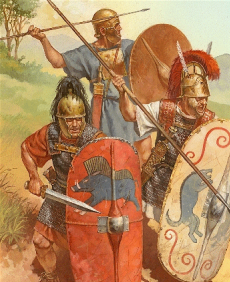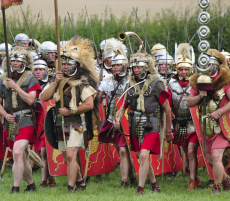
After Scipio Africanus marched triumphantly down the streets of Rome he was hailed as a God, the great slayer of Hannibal and conqueror of Africa. The whole idea of the Roman Republic, as we saw in previous articles, was to limit any individual's power so as to prevent a monarchy. Though the System is rather complicated to explain fully, the Roman career path involved holding several positions of importance before one could ultimately be appointed one of the two consuls who shared control of Rome for one year. There was also a certain age requirement for these positions because the Romans felt that with age comes experience which is largely true. Therefore, when Scipio Africanus was appointed Consul in his twenties and having not followed the correct career path this showed cracks in the Republic's oligarchical system; that it could be exploited. As such ambitious men in Rome began to realise this and exploited the system over the next century to their advantage, until the legendary Gaius Julius Caesar became supreme dictator, and his adopted heir Octavian reigned as first emperor of the great Roman Empire.
After Scipio's triumph, Rome was at war again within a year, this time with the people of Macedon, north of Greece, home of Alexander the Great. The Macedonians had invaded and opressed the Greeks for centuries so the Romans claimed that the war was to protect their Greek allies, to liberate them from Macedonian influence. In reality, Macedon had supported and supplied Hannibal somewhat during the Second Punic War and Rome wanted revenge, but as ever they had to try and justify their actions morally. A man named Titus Quinctius Flamininus oversaw the defeat of Macedon and was hailed as the saviour of Greece. Making sure to emphasise his apparent love of Greek culture and art he became a hero in the Hellenic world and even had his face imprinted on Greek coins. Flamininus was revered as a god in Greece but lacked the ambition to capitalise on this. Next came the Gracchi brothers Tiberius and Gaius who proposed many social reforms in order to gain the support of the plebeian people as well as one of the elite orders, the equestrians. Ultimately both were murdered for their actions as the Senate worried they were gaining too much power. You can see by these events how the Roman Republic really focused on limiting individual power but that ambitious 'warlords' began to realise the potential power they could muster.

The first real threat to the Republic's system is arguably with the army reforms of Gaius Marius, a young military general who was consul 7 times during his lifetime! Gaius Marius proved himself to be a worthy and noble fighter with a genius military mind and by 100 BC this young general was called upon to be consul and help defend Rome from the Cimbri and Teutones Tribes that had invaded Northern Italy. In reality these tribes wanted only to live off the fertile land in northern Italy but a foolish consul had ordered their negotiators murdered and now the tribes were pillaging and looting Roman villages and had already defeated several Roman armies. The consuls required military glory but had often only held political posts before in their lives and so multiple Roman armies were defeated because their generals were inexperienced and overwhelmed by the sheer number and ferocity of the tribes they were fighting. Therefore they called on Marius to be consul two years running (which defied Roman law) in order to help defend Rome. Up to this point only land owning Roman citizens could join the military and had to buy their own armour and weapons which meant the Roman force was elite but relatively small. Marius identified that by recruiting men within Roman borders that were not necessarily roman citizens they could increase the size of the army greatly. He drilled his new recruits mercilessly and made them carry all their rations and supplies on their backs which reduced the need for supply trains and made the army more mobile. With Marius' reforms and his genius military mind the Teutones and Cimbri tribes were defeated and he was hailed as a saviour of the Roman people.
Marius' reforms meant that there was now a constant army and that the soldiers were paid to fight as a profession so they reported to a specific general and not the state. Though Marius did not truly realise the potential, another warlord named Lucius Corenlius Sulla Felix gained control of his own army that he paid rather than the state and marched on Rome, ruling as dictator. Although he then chose to step down after a short time Sulla had shown how Marius' army reforms had not saved the republic but doomed it because now an aspiring and rich General could control an entire army to fight for him personally rather than the state. The most prominent warlords of the Republic are perhaps Pompey and Caesar, as well as Marc Antony and Octavian. These two pairs clashed over the future of Rome and saw the fall of the Republic rise into the birth of the Empire, but that's a story for another time!
IMAGE 1: http://img10.xooimage.com/files/c/f/e/1164366653-260f83.gif - This picture shows the Roman army during the Punic Wars
IMAGE 2: http://periklisdeligiannis.files.wordpress.com/2013/05/guard-roman.jpg - This shows the new and improved heavily armoured Roman force after Marius' reforms

0 Comment:
Be the first one to comment on this article.